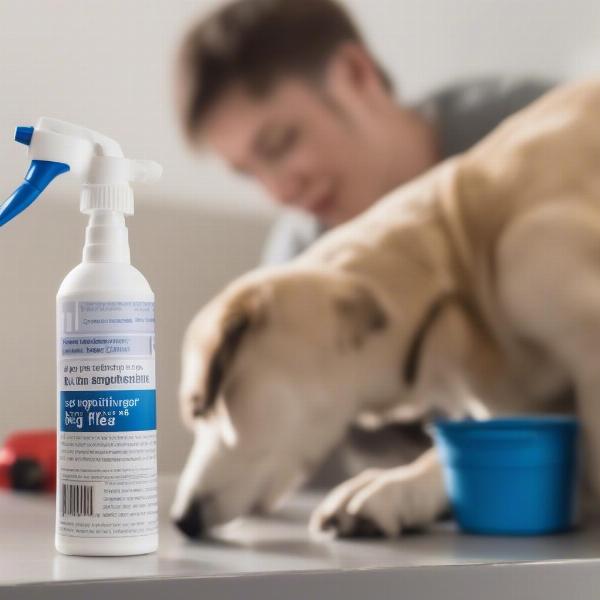Flea spray for dogs is a common solution for pet owners battling these pesky parasites. Choosing the right flea spray, however, can be overwhelming given the numerous products available. This guide will provide you with all the information you need to effectively use flea spray for dogs, covering everything from choosing the right product to understanding potential side effects and offering safe and effective alternatives. We’ll also discuss preventative measures to keep your canine companion flea-free all year round.
Choosing the Right Flea Spray for Your Dog
With so many flea sprays on the market, selecting the appropriate one for your dog can be challenging. Consider your dog’s age, breed, size, and health conditions before making a purchase. Always consult with your veterinarian, especially if your dog has sensitive skin or allergies. They can recommend the best flea spray for dogs based on your dog’s individual needs. Look for sprays with active ingredients specifically designed for dogs and avoid products formulated for cats, as these can be toxic to canines.
 Choosing the Right Flea Spray for Dogs
Choosing the Right Flea Spray for Dogs
Understanding Flea Spray Ingredients and Safety Precautions
Understanding the ingredients in flea spray for dogs is crucial. Common active ingredients include pyrethrins, permethrins, and fipronil. While generally safe when used as directed, some dogs may experience sensitivity to these chemicals. Always follow the manufacturer’s instructions carefully and never exceed the recommended dosage. Keep the spray away from your dog’s eyes, nose, and mouth. If your dog exhibits any adverse reactions like excessive scratching, redness, or vomiting, discontinue use and contact your veterinarian immediately.
How to Apply Flea Spray Effectively
For effective flea control, apply the spray evenly over your dog’s coat, ensuring it reaches the skin. Be particularly attentive to areas where fleas tend to congregate, such as the neck, base of the tail, and groin area. Avoid spraying your dog’s face directly. Instead, apply the spray to a cloth and gently wipe it on your dog’s face, taking care to avoid the eyes and nose.
Natural Alternatives to Flea Spray for Dogs
If you prefer a more natural approach, several alternatives to chemical flea sprays exist. herbal flea spray for dogs can be an effective option. Essential oils like lavender, cedarwood, and peppermint are known for their flea-repelling properties. However, it’s important to use pet-safe formulations and dilute them appropriately, as some essential oils can be toxic to dogs. Always consult with a holistic veterinarian before using essential oils on your pet. best flea spray for dogs also feature natural ingredients.
Preventing Flea Infestations
Prevention is always better than cure. Regular grooming, including bathing and combing, can help detect and remove fleas. Vacuuming your home frequently, especially areas where your dog spends most of its time, can eliminate fleas and their eggs. Washing your dog’s bedding regularly in hot water also helps disrupt the flea life cycle. Consider using a flea preventative like a monthly topical treatment or oral medication to offer ongoing protection. good flea spray for dogs can be part of a comprehensive flea prevention strategy.
Conclusion
Choosing the right flea spray for dogs requires careful consideration of your dog’s individual needs and potential sensitivities. anti chew spray for dogs addresses a different concern, but maintaining a flea-free environment is crucial for your dog’s health and comfort. By understanding the different types of flea sprays available, their ingredients, and how to apply them safely and effectively, you can help protect your furry friend from these pesky parasites and ensure they live a happy and healthy life.
FAQ
- How often should I use flea spray on my dog? Follow the instructions on the specific product you are using. Generally, most flea sprays recommend reapplication every few weeks or as needed.
- Can I use flea spray on puppies? Consult with your veterinarian before using flea spray on puppies, as some products may not be suitable for very young dogs.
- What should I do if my dog has an allergic reaction to flea spray? Discontinue use immediately and contact your veterinarian.
- Are there any natural alternatives to flea sprays? Yes, natural alternatives include herbal sprays and essential oils, but ensure they are pet-safe.
- How can I prevent flea infestations in my home? Regular vacuuming, washing bedding, and using preventative treatments can help prevent flea infestations. cat and dog flea treatment offers solutions for multi-pet households.
ILM Dog is a leading online resource dedicated to providing dog owners worldwide with reliable and practical information on all aspects of dog care and nurturing. From breed selection and health to training, nutrition, and grooming, we offer expert advice to help you provide the best possible care for your canine companion. We specialize in breed information, health and wellness advice, training tips, and product recommendations. Contact us today for personalized advice! Email: [email protected] Phone: +44 20-3965-8624. Visit ILM Dog for more information.